The serial "Harsh Realm" is based on the story of a war game simulation developed by the Pentagon, a secret project for testing new developments in training military personnel. People to be part of this system are under the control of the army and kept with their heads and bodies wired up, in a designated area.
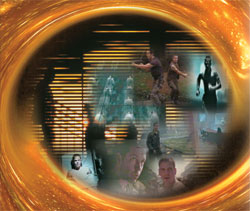 This Harsh Realm "game's" most stunning feature is that it recreates a totally realistic virtual environment where soldiers, enemies, weapons, social lives and all other details are indistinguishable from their counterparts in the real world. In this game, there are two types of people: the artificial or virtual characters, and the real players who can enter the game. Like their virtual environment, the virtual characters are indistinguishable from the real thing.
This Harsh Realm "game's" most stunning feature is that it recreates a totally realistic virtual environment where soldiers, enemies, weapons, social lives and all other details are indistinguishable from their counterparts in the real world. In this game, there are two types of people: the artificial or virtual characters, and the real players who can enter the game. Like their virtual environment, the virtual characters are indistinguishable from the real thing.
Another character in this TV serial is Omar Santiago, a deserter from the army who secretly manages to hack into the system and gains superiority in this virtual world. But because no one knows how he breaks into the system or where he is, they can't take action against him. Tom Hobbes, the hero, is told to eliminate Santiago and to prevent his evil plans for the world.
A colonel briefs Hobbes about Harsh Realm, informing him that this system was designed to teach war strategies on a virtual-reality war game platform and that his job is to defeat Santiago. In order to persuade the reluctant Hobbes, the colonel gives him a headset and has him watch an introductory video on the Harsh Realm simulator. This video explains that the Harsh Realm project relied on satellite maps, the 1990 census, and some other classified data to create the game's environment, imitating people's real lives. The introductory video is terminated suddenly, and Hobbes realizes that while watching this tape, he was integrated into the game.
Hobbes, now in the virtual world called Harsh Realm, meets a soldier by the name of Pinocchio, who, like himself, was inducted by the army. This virtual world is so realistic that, Tom is fooled throughout the film, to the extent that he ends up even endangering his own life helping and pursuing the game's virtual characters.
As we'll shortly explore in more detail, the quality and details of the images that take place in people's fantasies can fool them into believing these events are real.
 3-D films are made by projecting images shot by two cameras, from two different angles, onto one screen. In reality, the viewer is not regarding a 3-D image, but an effect created by a special technique. The viewer wears color filtered or polarized glasses. Each lens of the glasses captures one of the two images, and the viewer's brain recombines the two, creating a 3-D image.
3-D films are made by projecting images shot by two cameras, from two different angles, onto one screen. In reality, the viewer is not regarding a 3-D image, but an effect created by a special technique. The viewer wears color filtered or polarized glasses. Each lens of the glasses captures one of the two images, and the viewer's brain recombines the two, creating a 3-D image.
The same is true in our real lives. All the images we see with our eyes are really two-dimensional, having only height and width. Because we have two eyes, similar to the two images we see when watching a 3-D film, we perceive the images as three-dimensional. This phenomenon explains why we're misled that the images on our personal "screens" are real. The depth, color, shadow and light of our three-dimensional visual images formed in our brain seem perfectly realistic. Their endless detail and continuous quality give us the impression of living a real life. However, our perceiving a three-dimensional picture does not prove that it has any counterpart in the external world.
 The virtual world depicted in the serial "Harsh Realm", no matter how life-like it may be, is "seen" by players whose wired-up bodies are lying on their beds. All their realistic experiences are induced by artificial electrical impulses received by their brains. In each episode, the introductory scene recaps the subject of the series in this way:
The virtual world depicted in the serial "Harsh Realm", no matter how life-like it may be, is "seen" by players whose wired-up bodies are lying on their beds. All their realistic experiences are induced by artificial electrical impulses received by their brains. In each episode, the introductory scene recaps the subject of the series in this way:
A world exists exactly like ours. You live in this world, your family and your friends. No, you may not know it. I was sent to save you. It's just a game.
In his first few days of his adventure in the virtual world, Tom can't stop himself from thinking that the environment around him is not real, even though he knows it's not.
| Tom Hobbes | : | Now, I know none of it is real and it is only a virtual world I'm in. I'm living day to day ... trying to make sense of all this, trying to stay strong trying my best just to stay alive. |
|---|
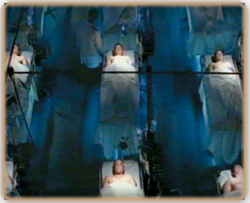 Repeatedly, our hero remarks on his virtual environment's stunning resemblance to reality itself. The world he's now part of gives him such a strong sense of reality that he begins to pray that his experience is part of a game.
Repeatedly, our hero remarks on his virtual environment's stunning resemblance to reality itself. The world he's now part of gives him such a strong sense of reality that he begins to pray that his experience is part of a game.
| Tom Hobbes | : | We're on the run from Omar Santiago, a renegade soldier who hijacked the computer program that runs this world. It was Santiago the military sent me here to kill. Their fear of him is real and great, though I've yet to understand why all this is imaginary… They say this is a recreation of the real world down to every man, woman and child. Each of us is with a double here who can live or die in the virtual reality of the Harsh Realm… But only those plugged into the program know this and have any consciousness of the truth: that it's only a game. I pray that's all it is. |
|---|

The scenes from this serial apply to our own lives, because we are watching the images projected onto our souls and interact only with them. We can never have direct experience of the world on the outside or experience the original thereof. This situation can be summed up in the following passage from our book Evolution Deceit:
• Since matter is a perception, it is something "artificial." If this perception must have been caused by another power, it must have been created. Moreover, if this Creation were not continuous and consistent, then what we call matter would vanish and be lost. This may be compared to a television that displays a picture as long as the signal keeps being broadcast.
So, Who makes the stars, the Earth, plants, people, our bodies and all else that our soul sees?
It is very evident that a supreme Creator has created the entire material universe—the sum of perceptions—and He endlessly continues His Creation. This Creator is Allah, the Almighty and Omniscient ... This Creator introduces Himself to us. He has sent down the Qur'an, in which He introduces to us the universe, Himself, and the reason for our existence.(The Evolution Deceit, 7th edition, p.228)

One reason for our difficulty in realizing matter's true nature is our mistaken belief about our own bodies. We look down, see ourselves, touch everything around it, and get the misinterpreted impression that we live in an "outside world."
In reality, our bodies are copies—images, like all our other perceptions of the external world. Therefore the body we interact with is not the original on the outside but its imagination forming inside our brain by the interpretation of our perceptions.
Below is one of the dialogues from the serial:
| Tom Hobbes | : | I had orders to win the game. |
|---|---|---|
| Major Watters | : | It's no game, no getting out, no going home. I've got the same mission. |
| Tom Hobbes | : | Why don't they take Santiago out of the real world? |
| Pinocchio | : | They don't know where he is, where he comes in and out. He has hijacked the whole program ... If they kill you here, it's not any virtual character, but you. Your brain, your consciousness, your head and your mind will slide back into the real world. |
Those playing the Harsh Realm game interact with virtual appearances, as in a computer game. Their real bodies are located somewhere else, and computers transmit the game's images to their brains.
The following page shows Inga Fossa, a member of the armed forces, being transferred to this virtual environment. She is stretched out on an armchair in a high-tech room, putting a special device on her head. Once her body is scanned in, she is then transferred into the simulation Subsequent photos show her inside the government building in the Harsh Realm game's city of Santiago.
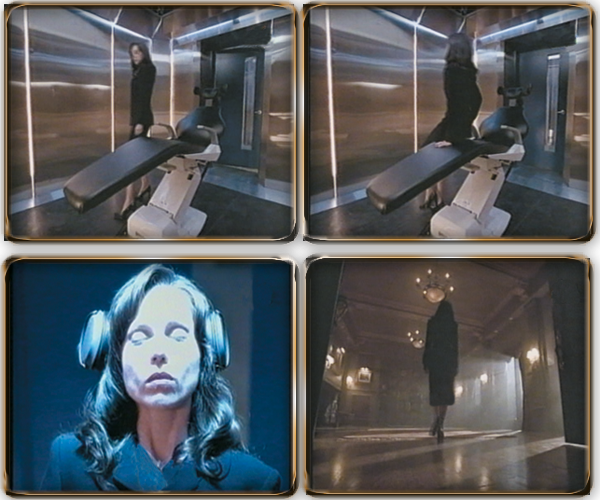
The pictures below depict Pinocchio, one of the lead characters of the film, with facial injuries and his body tied up with cables. But inside the Harsh Realm game he has no such wounds. This example shows that by means of artificial signals, someone can perceive his appearance much differently from what it actually is.
On this subject, here are some excerpts from our books:
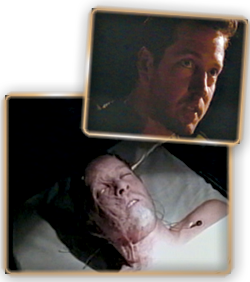 |
|---|
| The serial's hero Pinocchio, with his facial injuries |
• A person may dream that he is in the middle of a war. He might feel tension and panic as if the war were taking place in the real world. Yet at that time, he is sleeping comfortably at home. The realistic noises and visions of his dream occur in his mind.(Matter: The Other Name for Illusion, p.62)
• While you read these lines, you are not truly inside the room you assume you're in. On the contrary, the room's inside you. Seeing your body, you think that you are inside it. However, you must remember that your body, too, is an image formed inside your brain.(The Evolution Deceit, 7th edition, p.223)
When someone sees a tree and thinks it is real, he is deluding himself. It's impossible for us to leave our brains, impossible to reach the real tree. As stated throughout this book, the person is interacting with a tree formed by the interpretation of electrical signals in his brain.
We can compare the assumption that we deal with physical reality itself, to our interaction with the visible images on a computer screen. Touch the keys on the keyboard, and you believe you are moving the cursor on the screen. In reality, the computer sends a data stream to the CPU (central processing unit). This data stream calculates the cursor's new location and refreshes the image on the screen accordingly. In older computers, there was a noticeable delay between typing a command and seeing it appear on the screen. Since then, computers have become much faster and can recalculate image changes in a fraction of a second. Now when you hit a key, the effect on the screen is almost simultaneous. We get the feeling that we are, indeed, moving the cursor.
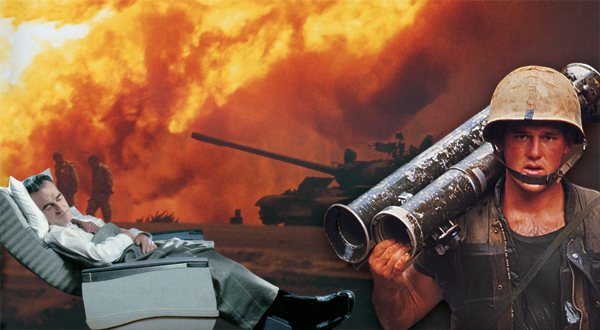 |
|---|
| Someone sleeping silently can see himself, in a dream, in the midst of a war, with bombs exploding all around. |
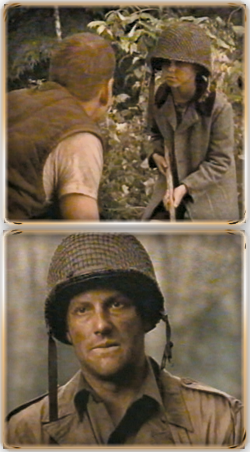 Our everyday experiences are comparable. When we want to kick a stone, the will to move our foot is transmitted to the relevant muscles, and our shoe is moved to connect with the stone. The brain receives feedback from the body—in this instance, the hardness of the stone's impact and pain in the foot—and updates the perception. In reality there is a delay in our experiences, just as in the computer example. It takes approximately one fifth of a second for the brain to interpret the data sent by our senses but, not being aware of this delay, we assume that we are interacting directly with the physical reality.
Our everyday experiences are comparable. When we want to kick a stone, the will to move our foot is transmitted to the relevant muscles, and our shoe is moved to connect with the stone. The brain receives feedback from the body—in this instance, the hardness of the stone's impact and pain in the foot—and updates the perception. In reality there is a delay in our experiences, just as in the computer example. It takes approximately one fifth of a second for the brain to interpret the data sent by our senses but, not being aware of this delay, we assume that we are interacting directly with the physical reality.
If all we can ever know is limited to images forming in our minds, how can we know what the outside world is really like? Isn't everything we know about it just an assumption? Yes, and proving it so is impossible, because for those who imagine they have direct contact with the original of a physical world, the only evidence is the visions in their minds.
The position of those who believe they have direct experience of the original of matter is just as untenable as claiming that our experiences in virtual reality environment are authentic. Throughout the serial, Pinocchio points out to Hobbs that it's not logical to act as if their environment were real. In one episode, Tom encounters his fiancée's virtual counterpart and risks his life trying to protect her, even though she has no physical reality. Likewise, a virtual copy of his real-life dog is present in the game, and he endangers himself to keep the dog from harm.
In another scene from the film, he encounters a small child in an area designated—in the game—for warfare training. Feeling concern for the child, he tells him that it is very dangerous to be there, but the soldier with Tom tells him that the child is only a part of the computer game:
| Tom Hobbes | : | (to the boy) What are you doing here? Go on home. |
|---|---|---|
| Eric Sommers | : | Don't get too fond of him. |
| Tom Hobbes | : | Why not? |
| Eric Sommers | : | Look, I've seen this played 100 times. That kid does not pass Day 28 once. |
| Tom Hobbes | : | He is here. |
| Eric Sommers | : | He's just a game piece. He is not like you and me. The sim (simulation) resets them so that they can come and die all over again. |
Knowing he is in a virtual world, Tom is repeatedly reminded that the virtual characters he interacts with are part of the simulation. Yet he reacts to them, fooled by the environment's realism. When the war escalates, for instance, and they are seeking cover, he sees a child walking towards the enemy positions. He cannot contain himself and risks his life to save the child.
| Pinocchio | : | What are you doing? |
|---|---|---|
| Eric Sommers | : | It's just a kid. |
| Pinocchio | : | You heard what Sommers said about this place. You can't change anything. |
| Tom Hobbes | : | I don't believe that. |
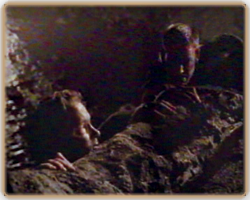 In another scene, they are withdrawing from the enemy, when he sees the child coming under fire. He reaches out to the child, but its body disappears. As he had been warned, the child is shot dead as part of the game and won't be reintroduced to it until the game starts over anew.
In another scene, they are withdrawing from the enemy, when he sees the child coming under fire. He reaches out to the child, but its body disappears. As he had been warned, the child is shot dead as part of the game and won't be reintroduced to it until the game starts over anew.
These examples from the film are illustrative of people who can't accept that the world they're dealing with is a simulation in the brain. Obviously, the world we live in isn't comparable to a film, because it cannot be explained by computer games or technological developments. Allah created this world and everything it contains, animate or inanimate, and revealed the purpose for our Creation in the Qur'an:
[I only created] man to worship Me. (Surat adh-Dhariyat: 56)
For this reason, we have an obligation to obey Allah's commandments and to worship Him.
Many fool themselves by telling themselves, "I see with my eyes, I hear with my ears. Therefore, the world I'm in is real." In actuality, they're thinking those words in the silence of their brains. These technical realities are obvious truths that can be learned in high-school biology textbooks or in any book on human anatomy. All branches of medicine teach in great detail how vision and sensations originate in the brain.
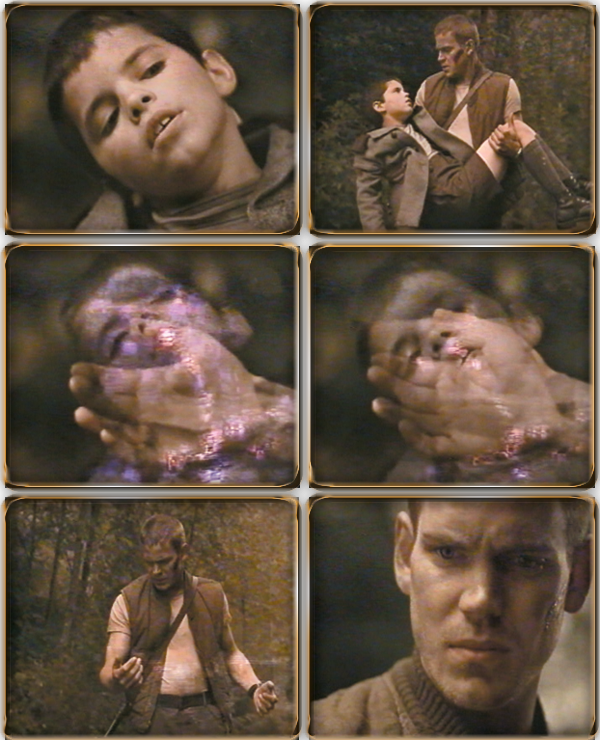
Advancements in quantum physics, psychology, neurology, biology and medicine have shed much light on the technical aspects of this physical reality. At present, therefore, science accepts that we cannot reach the reality of matter. Anyone who claims to be interacting with the real world is ignoring these scientific facts. We have to accept them and live in awareness of our responsibilities to Allah in our lives, even though we live those lives only in our minds. Following are some passages from our books on this subject:
• In the past, some have grasped the truth about the essence of matter. Yet because their faith in Allah and their understanding of the Qur'an were weak, they have produced deviant ideas. Some have said, "Everything is an illusion, so there is no point in worship." Such ideas are twisted and ignorant. True, everything is an image Allah presents to us. But it is also true that Allah charges us to abide by the Qur'an. We have to carefully abide by His commands and prohibitions. (Matter: The Other Name for Illusion, p.214)
Even though Allah causes us to live in this world of perceptions, He also links the world to all its many causes and effects. When we are hungry, for instance, we eat something. We do not say, "It is all an illusion, so it does not matter," for if we fail to eat, we grow weak and eventually die.
| ...I have only been ordered to worship Allah and not to associate anything with Him. I summon to Him, and to Him I will return.(Surat ar-Rad: 36) |
|---|
| |
Allah can remove these causes and effects whenever He wishes, for whoever He wishes, by whatever means He wishes. We can never know when or why He may do this. However, the most important truth is that Allah charges us with abiding by the whole of the Qur'an, and we continue to live in the world of causality in order to abide by its Divine commandments.
Adnan Oktar: But some people sometimes misinterpret free will. As if we could have any knowledge of our own independent of Allah. In other words: "Allah leads us to a path, but then we take a new decision without Allah's knowing. And Allah only learns of that decision later on."
That is polytheism. It is out of the question. All of eternal life, all of timelessness and eternity, is over and done with in the Sight of Allah. In other words, saying that Allah will provide an image in a space the size of a lentil, which we will experience in our consciousness, but Allah will be unaware of what we do. The illogicality of that is obvious. It is polytheism. But we do also have free will. I mean, when we want to decide on a thing we decide for ourselves. But we decide because that is in destiny, because Allah so ordains. I mean, Allah says, "you will not will unless Allah wills." (Surat al-Insan, 30) First Allah wills, then us. Insha'Allah. (From Mr. Adnan Oktar's Kanal 35 interview, 21 February, 2009)
 In an earlier chapter, we pointed out that time is relative, not fixed, dependent on the viewer's perception. Knowing this is very important in comprehending the question of destiny, which represents Allah's Creation of everything—past or future—in one moment. This means that everything in the Presence of Allah, from the Creation of the universe to the Judgment Day, has been lived and is already finished.
In an earlier chapter, we pointed out that time is relative, not fixed, dependent on the viewer's perception. Knowing this is very important in comprehending the question of destiny, which represents Allah's Creation of everything—past or future—in one moment. This means that everything in the Presence of Allah, from the Creation of the universe to the Judgment Day, has been lived and is already finished.
A great many people cannot comprehend how Allah can know things that have not yet happened and how it can be that in Allah's Presence, everything past and future has already occurred. They also fail to understand the reality of destiny. In reality, past events are the past only from our perspective, because we live within the boundaries of time that Allah has created, and cannot know anything unless it is introduced to our memory. Allah, on the other hand, is unfettered by time and space, because, after all, it is He Who has created them from nothing. For this reason, past, present, and future are all the same to Allah.
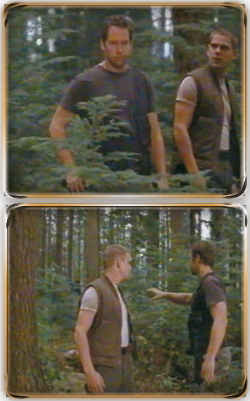 The fact is, everything, past or future, has already been created in the Presence of Allah and preserved. The very important truth is that every human being has surrendered unconditionally to his destiny. Just as no one can change his past, he cannot change his future, because both his past and future have already been lived. All his future is fixed: where, when and what he will eat; what he will talk about and with whom; how much money he will earn, what illnesses he will endure; and finally, the circumstances of his death— all these events are fixed. He cannot change any of it, because this has all been lived in Allah's Presence, with His knowledge. Except the knowledge thereof has not been granted to the memory of the person himself.
The fact is, everything, past or future, has already been created in the Presence of Allah and preserved. The very important truth is that every human being has surrendered unconditionally to his destiny. Just as no one can change his past, he cannot change his future, because both his past and future have already been lived. All his future is fixed: where, when and what he will eat; what he will talk about and with whom; how much money he will earn, what illnesses he will endure; and finally, the circumstances of his death— all these events are fixed. He cannot change any of it, because this has all been lived in Allah's Presence, with His knowledge. Except the knowledge thereof has not been granted to the memory of the person himself.
Therefore, those who are saddened by what they encounter, grow angry, shout and scream, worry about the future, or become overly ambitious, do so in vain. The future they worry about has already been lived. Whatever they may do, they have no means of changing it.
One episode of "Harsh Realm" can help us understand this. In this episode, set in the Second World War, the leading characters walk in the woods but, because of fault in the computer program, suddenly find themselves in a constantly recurring war game simulation.
| Tom Hobbes | : | What the hell is that? Software glitch? |
|---|
In this part of the game, the Ardennes offensive of World War II is simulated. German and American advance units are dug in either side of a bridge and are engaged in month long battle between them.
| Tom Hobbes | : | That bridge out there. I've seen the battle review of the Ardennes campaign, Second World War. There is a siege in Hotten, Belgium between two small advance units, the German and the American armies, lasted over a month. I swear, this is the same bridge. |
|---|---|---|
| Pinocchio | : | It's a combat sim. |
| Tom Hobbes | : | What? |
| Pinocchio | : | Virtual combat simulation. When they started beta testing in Harsh Realm, they downloaded battle scenarios: Pork Chop Hill, Picket's Charge. |
| Tom Hobbes | : | So, it's another game. |
| Pinocchio | : | It's a battlefield trainer, what Harsh Realm was originally designed for. |
| Tom Hobbes | : | What is it still doing here? |
| Pinocchio | : | Who knows? Probably oversight. Some pencil neck in the real world probably forgot to "delete." |
The serial's heroes find themselves in a different time. Just as they are about to be shot by a German soldier, a unit of American soldiers rescues them. But being from a different era, their speech makes the American soldiers suspect them to be spies and take them as prisoners of war.
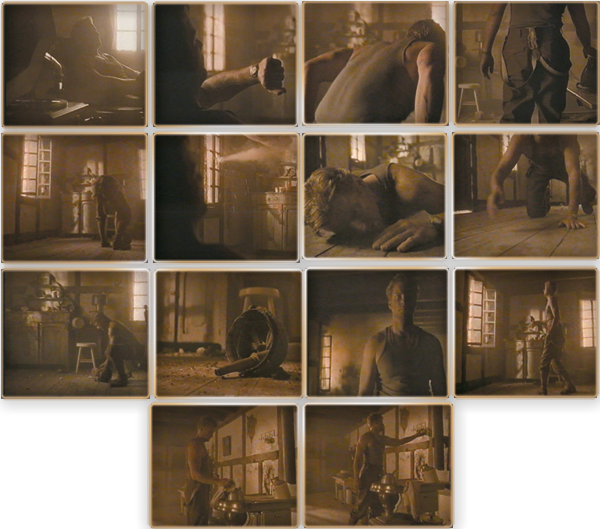
In the opening scenes, a soldier named Eric Sommers—who also exists in the real world—draws attention by his cool stance despite the explosions all around him. Because this is a repeating war training simulation, everything occurs as programmed. Aware of this, he lies on the ground and begins a countdown. When he gets to three, a hand grenade lands next to him. He picks it up, throws it back out again, then continues to drink his tea. In short, everything develops as part of the program. Because it repeats itself, with everything occurring in the same way time after time, Eric keeps his cool even under fire.
| Eric Sommers | : | Three… two...one. (He throws the grenade outside, then takes a glass of tea) Grenade. |
|---|
 |
|---|
| It is predetermined and destined where which leaf will fall in autumn and what flower will blossom in spring. |
 |
|---|
| It is predetermined that the gardener waters a rose, that its first flower blossoms, that the owner picks it and places it in a basket—even before it is even planted. |
Like Hobbes and Pinocchio, Eric Sommers was made part of the game in the real world when he was connected to the computer. Therefore, the soldier also knows that the time and place they live in has no reality. But he was unable to find a way out of this part of the game. He tells Tom and Pinocchio that in this battle field of four square kilometers, everything always occurs as it is programmed to. For example, the siege always lasts 34 days, the counterattack 28 days; and how and when the brigade's soldiers die is also known.
These parts of the serial constitute an analogy that can help explain fate. If we compare our life to a video tape, we are watching it, but without the means of fast-forwarding or rewinding it. No matter how often we watch this tape, we cannot change even its smallest detail. The parts that appear to be changed by us are in reality also predetermined parts of the film.
It is Allah Who has determined this film in every detail, creating and sustaining it with the feel of reality. He sees and knows the entire filmstrip in the same instant. Just as we can see the beginning, middle, and end of a ruler as a single whole, Allah has encompassed the time we are subjected to, from the beginning to the end, as one moment. People, on the other hand, live out only what they are meant to when the time has come and witness the destiny Allah has created for them. This is so for the destinies of all of the people on Earth.
• Allah has made us perceive events in a definite series, as if time were moving from past to future. He does not inform us of our future or provide this information to our memories. The future does not lie in our memories, but all human pasts and futures are in Allah's guardianship (hifz). This, again, is like observing a human life as if it were in a film, already wholly depicted and complete. One cannot advance the film and sees his life as the frames pass, one by one. He is mistaken in thinking that the frames he has not yet seen constitute the future.(Matter: The Other Name for Illusion, p.144)
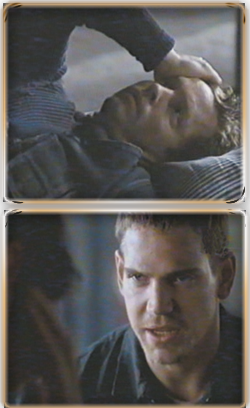 • … Anyone who believes in destiny won't be troubled by or despair about things that happen to him. On the contrary, he will have the utmost trust and confidence in his submission to Allah…Allah determines the difficulties that human beings experience, together with their wealth and success. All these things are part of the destiny predetermined by our Lord to test not only human beings, but also all things animate and inanimate. The Sun, the Moon, mountains and trees have their destiny determined by Allah.(Matter: The Other Name for Illusion, p.150)
• … Anyone who believes in destiny won't be troubled by or despair about things that happen to him. On the contrary, he will have the utmost trust and confidence in his submission to Allah…Allah determines the difficulties that human beings experience, together with their wealth and success. All these things are part of the destiny predetermined by our Lord to test not only human beings, but also all things animate and inanimate. The Sun, the Moon, mountains and trees have their destiny determined by Allah.(Matter: The Other Name for Illusion, p.150)
• … It is pointless to be fearful and worry about a life whose every moment has been lived, experienced and is still present in the awareness of Allah. … Actually, everyone is already in submission to Allah, created in subservience to Him. No matter whether he likes it or not, he lives subservient to the destiny Allah created for him… For a person who submits himself to Allah, knowing that there is nothing better for him than the destiny Allah created for him, there is nothing to fear or be anxious about. This person will make every effort, but knows that no matter what he does, he won't be able to change what is written in his destiny.
• A believer will submit himself to the destiny Allah created. In the face of what happens to him, he will do his best to understand the purpose of these happenings, take precautions, and make an effort to change things for the better. But he will take comfort in his knowledge that all things come to be according to destiny, and that Allah had determined the most beneficial things in advance.(Matter: The Other Name for Illusion, pp.152-153)
Adnan Oktar: Almighty Allah is timeless and eternal, apparent and hidden. He exists eternally, before and after. We had already had this conversation when my great, great-grandfather was still a child, down to the tiniest detail. That question had been asked. These things were long finished with in the Sight of Allah. All right, we said these things of our free will, but it had already happened word for word in the Sight of Allah. But it as if we were speaking as we wish. As if we were speaking of our own free will. But we had already had this conversation before the world was made, and it was already over and done with. Almighty Allah describes the lives of the people of paradise in the Qur'an, and the lives of those in hell. The situation of Abu Jahil, for instance. He was in hell before he was even born, before his father was born. He was living in hell. There is a verse about it in the Qur'an, about Abu Lahab. "Ruin to the hands of Abu Lahab" (Surat al-Masad, 1), says Almighty Allah. "...his wife, the firewood carrier" (Surat al-Masad, 4). The man is alive, but in hell, together with his wife, and that is their destiny. This is a law of Almighty Allah that people cannot understand and are baffled by. In other words, Allah created time subsequently. Space was also ceated subsequently. That is what the Big Bang, the first explosion was. Time and space are things belonging to us. People who are unaware of this truth of course think differently. But people who think deeply and honestly will immediately understand it. These are explicit statements in the Qur'an, and we are subject to destiny. We do whatever Allah commands, insha'Allah. (From Mr. Adnan Oktar's Çay TV interview, 27 August 2009)
The guards of a concentration camp capture Tom Hobbes. He is imprisoned there and made to work in the timber yard. In the virtual environment, he meets his mother's copy. Finding out that she suffers from terminal cancer, he forgets that what he sees here is a virtual reality and tries to help her.
 |
|---|
| Someone who falls asleep while fishing at the beach could, in his dream, see himself on a sinking ship and experience quite realistic fear and panic. While he was seated on his beach chair, his dream could make him believe, mistakenly, that he's in a material world. |
The camp guards have wounded his friend Pinocchio. When Tom tells him his plans, the following conversation takes place:
| Tom Hobbes | : | How are you feeling? |
|---|---|---|
| Pinocchio | : | If it ain't real, how come it hurt so much? |
| Tom Hobbes | : | We have to get out of here… It's more complicated than that. |
| Pinocchio | : | How's that? |
| Tom Hobbes | : | I found my mother. She's here. |
| Pinocchio | : | Your mother? Hobbes, I've met people here. People I know in the real world. |
| Tom Hobbes | : | It's her. |
| Pinocchio | : | No. It just looks like her. Everybody in the world has a copy here. That's how the whole thing is set up. But it is VC (virtual character) files not people. |
| Tom Hobbes | : | She recognized me. She knows who I am. |
| Pinocchio | : | She doesn't know. She is part of some game. She doesn't know what's happened to you. She thinks this is all real. |
| Tom Hobbes | : | She's in pain. How different is that from what you feel? |
At a later point in the series, the heroes find themselves wounded and in pain, even though in reality they are lying on beds. They think their pains are real, though actually they have been artificially induced.
Our books also explain that people believe they are interacting with real matter because of their feeling fierce pain, aches, fear, and the like. In truth, this is a mistake. Human beings are never interacting with real matter. Some passages from our books on this subject read as follows:
• When someone cuts her hand, the pain and wetness all form in the brain. Dreaming that she has cut her hand, that same person might experience the same sensations. Yet in her dream, she is simply seeing an illusion, and there is no real knife or bleeding wound. That being the case, our feelings of pain do not alter the fact that we see all our lives as images within our brains.(Matter: The Other Name for Illusion, p.184)
• … All sensations—touch, pressure, hardness, pain, heat, cold, and wetness— also form in the human brain, in precisely the same way that visual images are formed. For instance, someone who gets off a bus and feels the cold metal of the door actually "feels" the cold metal in his brain. . . As we have already seen, the sense of touch occurs in a particular section of the brain, through nerve signals. For instance, it is not your fingers that do the feeling. People accept this because it has been demonstrated scientifically. But when it comes to the bus hitting someone—in other words, when the sensation of touch is violent and more painful—they think that somehow, this fact no longer applies. However, pain or heavy blows are also perceived only in the brain. Someone hit by a bus feels all the violent pain of the event in his brain. … A person may dream of being hit by a bus, of opening his eyes in the hospital, being taken for an operation, the doctors talking, his family's anxious arrival at the hospital; and later, that his being crippled or suffering terrible pain. In his dream, he perceives all the images, sounds, feelings, and other aspects of the incident, very clearly and distinctly—all as natural and believable as in real life. At that moment, if the person were told it was only a dream, he wouldn't believe it. Yet all that he is seeing in his dream is only an illusion, and the bus, hospital and even his own body have no physical counterparts in the real world. Still, he feels as if his real body has been hit by a real bus.(Matter: The Other Name for Illusion, p.178)
• A sharp blow, violent slap, or the pain from a dog's bite are not evidence that you are dealing with matter. As we have seen, you can experience the same things in dreams, with no corresponding physical counterparts. Furthermore, the violence of any sensation does not alter the clearly proven scientific fact that the sensation in question occurs in the brain.(Matter: The Other Name for Illusion, p.180)
• Events that produce difficulties, worries and fear are illusions occurring in the brain. A person who sees these illusions for what they really are doesn't feel anxious because he finds himself in difficulties, nor does he complain about them. Even if he were confronted by an aggressive and dangerous enemy, he'd know that he is facing illusions in his brain and would not be overcome by fear or hopelessness. He knows that each one of these things is an apparition Allah formed, which He created for a purpose. No matter what he encounters, he is at peace in his trust and submission to Allah. (Matter: The Other Name for Illusion, p.119)